- Home
- John Boyne
The Boy in the Striped Pajamas (Deluxe Illustrated Edition) Page 9
The Boy in the Striped Pajamas (Deluxe Illustrated Edition) Read online
Page 9
Shmuel frowned. ‘What kind of mistakes?’ he asked.
‘Oh, countless ones,’ explained Bruno. ‘The thing about exploring is that you have to know whether the thing you’ve found is worth finding. Some things are just sitting there, minding their own business, waiting to be discovered. Like America. And other things are probably better off left alone. Like a dead mouse at the back of a cupboard.’
‘I think I belong to the first category,’ said Shmuel.
‘Yes,’ replied Bruno. ‘I think you do. Can I ask you something?’ he added after a moment.
‘Yes,’ said Shmuel.
Bruno thought about it. He wanted to phrase the question just right.
‘Why are there so many people on that side of the fence?’ he asked. ‘And what are you all doing there?’
Some months earlier, just after Father received the new uniform which meant that everyone had to call him ‘Commandant’ and just before Bruno came home to find Maria packing up his things, Father came home one evening in a state of great excitement, which was terribly unlike him, and marched into the living room where Mother, Bruno and Gretel were sitting reading their books.
‘Thursday night,’ he announced. ‘If we’ve any plans for Thursday night we have to cancel them.’
‘You can change your plans if you want to,’ said Mother, ‘but I’ve made arrangements to go to the theatre with—’
‘The Fury has something he wants to discuss with me,’ said Father, who was allowed to interrupt Mother even if no one else was. ‘I just got a phone call this afternoon. The only time he can make it is Thursday evening and he’s invited himself to dinner.’
Mother’s eyes opened wide and her mouth made the shape of an O. Bruno stared at her and wondered whether this was what he looked like when he was surprised about something.
‘But you’re not serious,’ said Mother, growing a little pale. ‘He’s coming here? To our house?’
Father nodded. ‘At seven o’clock,’ he said. ‘So we’d better think about something special for dinner.’
‘Oh my,’ said Mother, her eyes moving back and forth quickly as she started to think of all the things that needed doing.
‘Who’s the Fury?’ asked Bruno.
‘You’re pronouncing it wrong,’ said Father, pronouncing it correctly for him.
‘The Fury,’ said Bruno again, trying to get it right but failing again.
‘No,’ said Father, ‘the— Oh, never mind!’
‘Well, who is he anyway?’ asked Bruno again.
Father stared at him, astonished. ‘You know perfectly well who the Fury is,’ he said.
‘I don’t,’ said Bruno.
‘He runs the country, idiot,’ said Gretel, showing off as sisters tend to do. (It was things like this that made her such a Hopeless Case.) ‘Don’t you ever read a newspaper?’
‘Don’t call your brother an idiot, please,’ said Mother.
‘Can I call him stupid?’
‘I’d rather you didn’t.’
Gretel sat down again, disappointed, but stuck her tongue out at Bruno nonetheless.
‘Is he coming alone?’ asked Mother.
‘I forgot to ask,’ said Father. ‘But I presume he’ll be bringing her with him.’
‘Oh my,’ said Mother again, standing up and counting in her head the number of things she had to organize before Thursday, which was only two evenings away. The house would have to be cleaned from top to bottom, the windows washed, the dining-room table stained and varnished, the food ordered, the maid’s and butler’s uniforms washed and pressed, and the crockery and glasses polished until they sparkled.
Somehow, despite the fact that the list seemed to grow longer and longer all the time, Mother managed to get everything finished on time, although she commented over and over again that the evening would be a greater success if some people helped out a little bit more around the house.
An hour before the Fury was due to arrive Gretel and Bruno were brought downstairs, where they received a rare invitation into Father’s office. Gretel was wearing a white dress and knee socks and her hair had been twisted into corkscrew curls. Bruno was wearing a pair of dark brown shorts, a plain white shirt and a dark brown tie. He had a new pair of shoes for the occasion and was very proud of them, even though they were too small for him and were pinching his feet and making it difficult for him to walk. All these preparations and fine clothes seemed a little extravagant, all the same, because Bruno and Gretel weren’t even invited to dinner; they had eaten an hour earlier.
‘Now, children,’ said Father, sitting behind his desk and looking from his son to his daughter and back again as they stood before him. ‘You know that there is a very special evening ahead of us, don’t you?’
They nodded.
‘And that it is very important for my career that tonight goes well.’
They nodded again.
‘Then there are a number of ground rules which need to be set down before we begin.’ Father was a big believer in ground rules. Whenever there was a special or important occasion in the house, more of them were created.
‘Number one,’ said Father. ‘When the Fury arrives you will stand in the hall quietly and prepare to greet him. You do not speak until he speaks to you and then you reply in a clear tone, enunciating each word precisely. Is that understood?’
‘Yes, Father,’ mumbled Bruno.
‘That’s exactly the type of thing we don’t want,’ said Father, referring to the mumbling. ‘You open your mouth and speak like an adult. The last thing we need is for either of you to start behaving like children. If the Fury ignores you then you do not say anything either, but look directly ahead and show him the respect and courtesy that such a great leader deserves.’
‘Of course, Father,’ said Gretel in a very clear voice.
‘And when Mother and I are at dinner with the Fury, you are both to remain in your rooms very quietly. There is to be no running around, no sliding down banisters’ – and here he looked very deliberately at Bruno – ‘and no interrupting us. Is that understood? I don’t want either of you causing chaos.’
Bruno and Gretel nodded and Father stood up to indicate that this meeting was at an end.
‘Then the ground rules are established,’ he said.
Three quarters of an hour later the doorbell rang and the house erupted in excitement. Bruno and Gretel took their places standing side by side by the staircase and Mother waited beside them, wringing her hands together nervously. Father gave them all a quick glance and nodded, looking pleased by what he saw, and then opened the door.
Two people stood outside: a rather small man and a taller woman.
Father saluted them and ushered them inside, where Maria, her head bowed even lower than usual, took their coats and the introductions were made. They spoke to Mother first, which gave Bruno an opportunity to stare at their guests and decide for himself whether they deserved all the fuss being made of them.
The Fury was far shorter than Father and not, Bruno supposed, quite as strong. He had dark hair, which was cut quite short, and a tiny moustache – so tiny in fact that Bruno wondered why he bothered with it at all or whether he had simply forgotten a piece when he was shaving. The woman standing beside him, however, was quite the most beautiful woman he had ever seen in his life. She had blonde hair and very red lips, and while the Fury spoke to Mother she turned and looked at Bruno and smiled, making him go red with embarrassment.
‘And these are my children, Fury,’ said Father as Gretel and Bruno stepped forward. ‘Gretel and Bruno.’
‘And which is which?’ the Fury said, which made everyone laugh except for Bruno, who thought it was perfectly obvious which was which and hardly cause for a joke. The Fury stretched out his hand and shook theirs and Gretel gave a careful, rehearsed curtsy. Bruno was delighted when it went wrong and she almost fell over.
‘What charming children,’ said the beautiful blonde woman. ‘And how old are they, might I ask?’
‘I’m twelve but he’s only nine,’ said Gretel, looking at her brother with disdain. ‘And I can speak French too,’ she added, which was not strictly speaking true, although she had learned a few phrases in school.
‘Yes, but why would you want to?’ asked the Fury, and this time no one laughed; instead they shifted uncomfortably from foot to foot and Gretel stared at him, unsure whether he wanted an answer or not.
The matter was resolved quickly, however, as the Fury, who was the rudest guest Bruno had ever witnessed, turned round and walked directly into the dining room and promptly sat down at the head of the table – in Father’s seat! – without another word. A little flustered, Mother and Father followed him inside and Mother gave instructions to Lars that he could start heating up the soup.
‘I can speak French too,’ said the beautiful blonde woman, leaning down and smiling at the two children. She didn’t seem to be as frightened of the Fury as Mother and Father were. ‘French is a beautiful language and you are very clever to be learning it.’
‘Eva,’ shouted the Fury from the other room, clicking his fingers as if she were some sort of puppy dog. The woman rolled her eyes and stood up slowly and turned round.
‘I like your shoes, Bruno, but they look a little tight on you,’ she added with a smile. ‘If they are, you should tell your mother, before they cause you to injure yourself.’
‘They are a little tight,’ admitted Bruno.
‘I don’t normally wear my hair in curls,’ said Gretel, jealous of the attention that her brother was getting.
‘But why not?’ asked the woman. ‘It’s so pretty that way.’
‘Eva!’ roared the Fury for a second time, and now she started to walk away from them.
‘It was lovely to meet you both,’ she said, before stepping into the dining room and sitting down on the Fury’s left-hand side. Gretel walked towards the stairs but Bruno stayed rooted to the ground, watching the blonde woman until she caught his eye again and waved at him, just as Father appeared and closed the doors with a jerk of his head – from which Bruno understood that it was time to go to his room, to sit quietly, and not to make any noise and certainly not to slide down any banisters.
The Fury and Eva stayed for the best part of two hours and neither Gretel nor Bruno were invited downstairs to say goodbye to them. Bruno watched them leave from his bedroom window and noticed that when they stepped towards their car, which he was impressed to see had a chauffeur, the Fury did not open the door for his companion but instead climbed in and started reading a newspaper, while she said goodbye once again to Mother and thanked her for the lovely dinner.
What a horrible man, thought Bruno.
Later that night Bruno overheard snippets of Mother and Father’s conversation. Certain phrases drifted through the keyhole or under the door of Father’s office and up the staircase and round the landing and under the door of Bruno’s bedroom. Their voices were unusually loud and Bruno could only make out a few fragments of them:
‘…to leave Berlin. And for such a place…’ Mother was saying.
‘…no choice, at least not if we want to continue…’ said Father.
‘…as if it’s the most natural thing in the world and it’s not, it’s just not…’ said Mother.
‘…what would happen is I would be taken away and treated like a…’ said Father.
‘…expect them to grow up in a place like…’ said Mother.
‘…and that’s an end to the matter. I don’t want to hear another word on the subject…’ said Father.
That must have been the end of the conversation because Mother left Father’s office then and Bruno fell asleep.
A couple of days later he came home from school to find Maria standing in his bedroom, pulling all his belongings out of the wardrobe and packing them in four large wooden crates, even the things he’d hidden at the back that belonged to him and were nobody else’s business, and that is where the story began.
‘All I know is this,’ began Shmuel. ‘Before we came here I lived with my mother and father and my brother Josef in a small flat above the store where Papa makes his watches. Every morning we ate our breakfast together at seven o’clock and while we went to school, Papa mended the watches that people brought to him and made new ones too. I had a beautiful watch that he gave me but I don’t have it any more. It had a golden face and I wound it up every night before I went to sleep and it always told the right time.’
‘What happened to it?’ asked Bruno.
‘They took it from me,’ said Shmuel.
‘Who?’
‘The soldiers, of course,’ said Shmuel as if this was the most obvious thing in the world.
‘And then one day things started to change,’ he continued. ‘I came home from school and my mother was making armbands for us from a special cloth and drawing a star on each one. Like this.’ Using his finger he drew a design in the dusty ground beneath him.
‘And every time we left the house, she told us we had to wear one of these armbands.’
‘My father wears one too,’ said Bruno. ‘On his uniform. It’s very nice. It’s bright red with a black-and-white design on it.’ Using his finger he drew another design in the dusty ground on his side of the fence.
‘Yes, but they’re different, aren’t they?’ said Shmuel.
‘No one’s ever given me an armband,’ said Bruno.
‘But I never asked to wear one,’ said Shmuel.
‘All the same,’ said Bruno, ‘I think I’d quite like one. I don’t know which one I’d prefer though, your one or Father’s.’
Shmuel shook his head and continued with his story. He didn’t often think about these things any more because remembering his old life above the watch shop made him very sad.
‘We wore the armbands for a few months,’ he said. ‘And then things changed again. I came home one day and Mama said we couldn’t live in our house any more—’
‘That happened to me too!’ shouted Bruno, delighted that he wasn’t the only boy who’d been forced to move. ‘The Fury came for dinner, you see, and the next thing I knew we moved here. And I hate it here,’ he added in a loud voice. ‘Did he come to your house and do the same thing?’
‘No, but when we were told we couldn’t live in our house we had to move to a different part of Cracow, where the soldiers built a big wall and my mother and father and my brother and I all had to live in one room.’
‘All of you?’ asked Bruno. ‘In one room?’
‘And not just us,’ said Shmuel. ‘There was another family there and the mother and father were always fighting with each other and one of the sons was bigger than me and he hit me even when I did nothing wrong.’
‘You can’t have all lived in the one room,’ said Bruno, shaking his head. ‘That doesn’t make any sense.’
‘All of us,’ said Shmuel, nodding his head. ‘Eleven in total.’
Bruno opened his mouth to contradict him again – he didn’t really believe that eleven people could live in the same room together – but changed his mind.
‘We lived there for some more months,’ continued Shmuel, ‘all of us in that one room. There was one small window in it but I didn’t like to look out of it because then I would see the wall and I hated the wall because our real home was on the other side of it. And this part of town was the bad part because it was always noisy and it was impossible to sleep. And I hated Luka, who was the boy who kept hitting me even when I did nothing wrong.’
‘Gretel hits me sometimes,’ said Bruno. ‘She’s my sister,’ he added. ‘And a Hopeless Case. But soon I’ll be bigger and stronger than she is and she won’t know what’s hit her then.’
‘Then one day the soldiers all came with huge trucks,’ continued Shmuel, who didn’t seem all that interested in Gretel. ‘And everyone was told to leave the houses. Lots of people didn’t want to and they hid wherever they could find a place but in the end I think they caught everyone. And the trucks took us to a train a
nd the train…’ He hesitated for a moment and bit his lip. Bruno thought he was going to start crying and couldn’t understand why.
‘The train was horrible,’ said Shmuel. ‘There were too many of us in the carriages for one thing. And there was no air to breathe. And it smelled awful.’
‘That’s because you all crowded onto one train,’ said Bruno, remembering the two trains he had seen at the station when he left Berlin. ‘When we came here, there was another one on the other side of the platform but no one seemed to see it. That was the one we got. You should have got on it too.’
‘I don’t think we would have been allowed,’ said Shmuel, shaking his head. ‘We weren’t able to get out of our carriage.’
‘The doors are at the end,’ explained Bruno.
‘There weren’t any doors,’ said Shmuel.
‘Of course there were doors,’ said Bruno with a sigh. ‘They’re at the end,’ he repeated. ‘Just past the buffet section.’
‘There weren’t any doors,’ insisted Shmuel. ‘If there had been, we would all have got off.’
Bruno mumbled something under his breath along the lines of ‘Of course there were’, but he didn’t say it very loud so Shmuel didn’t hear.
‘When the train finally stopped,’ continued Shmuel, ‘we were in a very cold place and we all had to walk here.’
‘We had a car,’ said Bruno, out loud now.
‘And Mama was taken away from us, and Papa and Josef and I were put into the huts over there and that’s where we’ve been ever since.’
Shmuel looked very sad when he told this story and Bruno didn’t know why; it didn’t seem like such a terrible thing to him, and after all much the same thing had happened to him.
‘Are there many other boys over there?’ asked Bruno.
‘Hundreds,’ said Shmuel.
Bruno’s eyes opened wide. ‘Hundreds?’ he said, amazed. ‘That’s not fair at all. There’s no one to play with on this side of the fence. Not a single person.’

 Beneath the Earth
Beneath the Earth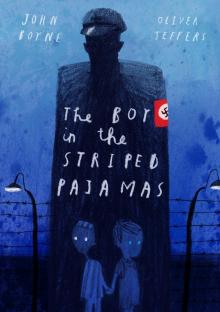 The Boy in the Striped Pajamas
The Boy in the Striped Pajamas Next of Kin
Next of Kin The House of Special Purpose
The House of Special Purpose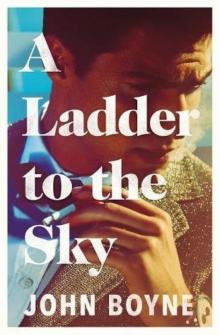 A Ladder to the Sky
A Ladder to the Sky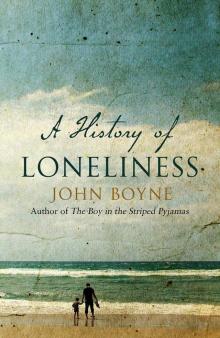 A History of Loneliness
A History of Loneliness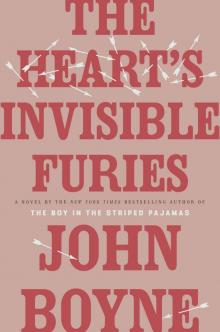 The Heart's Invisible Furies
The Heart's Invisible Furies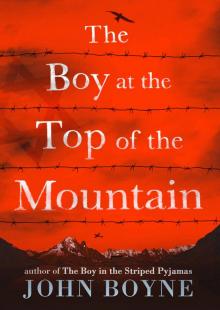 The Boy at the Top of the Mountain
The Boy at the Top of the Mountain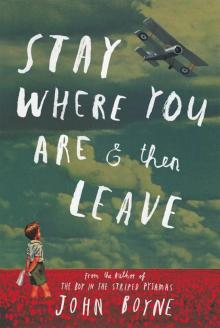 Stay Where You Are and Then Leave
Stay Where You Are and Then Leave Crippen: A Novel of Murder
Crippen: A Novel of Murder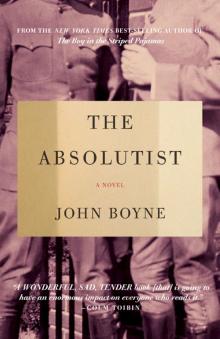 The Absolutist
The Absolutist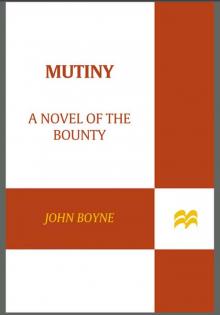 Mutiny: A Novel of the Bounty
Mutiny: A Novel of the Bounty A Traveler at the Gates of Wisdom
A Traveler at the Gates of Wisdom The Congress of Rough Riders
The Congress of Rough Riders The Thief of Time
The Thief of Time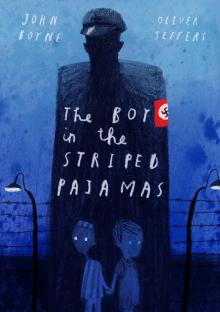 The Boy in the Striped Pajamas (Deluxe Illustrated Edition)
The Boy in the Striped Pajamas (Deluxe Illustrated Edition)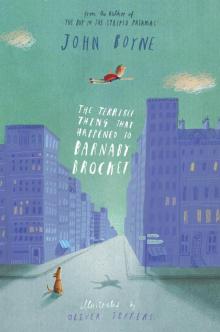 The Terrible Thing That Happened to Barnaby Brocket
The Terrible Thing That Happened to Barnaby Brocket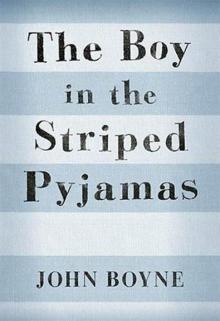 The Boy In The Striped Pyjamas
The Boy In The Striped Pyjamas Crippen
Crippen